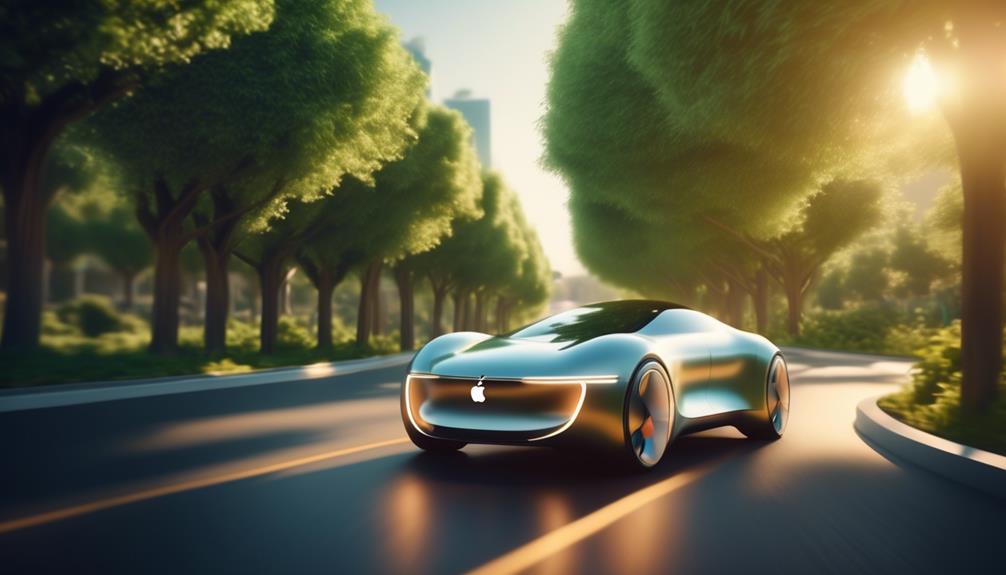The anticipation surrounding Apple's foray into the automotive industry has reached fever pitch, as the tech giant gears up to unveil its long-awaited electric car.
With limited information available, the speculation and rumors have only intensified. However, recent reports suggest that Apple's ambitions for a fully autonomous vehicle have been scaled back, raising questions about the company's approach to autonomous driving.
As Apple navigates partnerships and suppliers, including talks with Hyundai, the road ahead for their car remains uncertain.
This article will shed light on Apple's autonomous strategy, delve into Tim Cook's involvement and history, and discuss the potential challenges the company may face.
As the automotive industry braces for Apple's entrance, the question on everyone's mind is: what lies ahead for the Apple Car?
Apple Car Development Updates
The latest updates on the development of Apple's highly anticipated car project reveal significant progress and new partnerships in the works.
Apple has been focusing on battery technology advancements, aiming to incorporate an LFP battery chemistry into their electric car. This choice is in line with their interest in LG's electric powertrain joint venture with Magna International. By utilizing this battery technology, Apple aims to achieve improved performance and longer range for their vehicle.
However, the project has faced software integration challenges, as Apple has been investing in self-driving vehicle technology primarily on the software front. These challenges include ensuring smooth integration of autonomous driving features and developing robust software systems to support advanced driver-assistance systems.
Despite these challenges, Apple is making steady progress in their car development efforts.
Apple's Partnerships and Suppliers
Apple has engaged in major talks with Hyundai and explored partnerships with various suppliers in South Korea for its highly anticipated electric car project. Hyundai was initially rumored to be a potential manufacturing partner for Apple's car, with discussions centered around utilizing Hyundai Group's e-GMP chassis. However, talks with Hyundai have ended, and Apple is now exploring other options.
In addition to Hyundai, Apple has shown interest in partnering with suppliers in South Korea, including LG, SK Group, and Hanwha. Apple is particularly interested in using an LFP (lithium iron phosphate) battery chemistry for its electric car. Furthermore, Apple has expressed interest in LG's electric powertrain joint venture with Magna International.
These partnerships and suppliers will play a crucial role in the development and production of Apple's highly anticipated electric vehicle.
Apple's Approach to Autonomous Driving

After exploring potential partnerships and suppliers for its electric car project, Apple's focus now shifts to discussing its approach to autonomous driving. Despite limited information on the type of car they intend to build, Apple has been investing in self-driving vehicle technology, primarily on the software front.
Here are three key points to highlight Apple's approach to autonomous driving:
- Software advancements: Apple has been heavily investing in developing advanced self-driving software that can enable autonomous capabilities in their cars. This focus on software indicates that Apple sees the importance of creating a robust and reliable autonomous driving system.
- Driverless systems integration: Apple has been fitting driverless systems to existing vehicles, demonstrating their intention to integrate autonomous technology into their cars. This approach allows Apple to leverage existing platforms and vehicles while focusing on developing the necessary autonomous driving capabilities.
- Uncertainty remains: Despite their investments and efforts, Apple's autonomous plans remain uncertain, with no firm details on the type of car they intend to build. It is unclear whether Apple will pursue a fully autonomous vehicle or opt for a more advanced driver-assistance system.
Tim Cook's Involvement and History
Tim Cook's role and involvement in Apple's car project have been the subject of speculation and scrutiny since its inception. As Apple's CEO, Cook has been closely involved in the development of the Apple Car. While limited information has been released about his specific contributions, Cook's leadership in the automotive industry has been well-documented. Under his guidance, Apple has made significant hires and departures from the automotive industry, indicating the company's serious intent to enter the market.
Cook has also been pressed by Apple's board for updates on the progress of the car project. Although the details of Cook's involvement remain undisclosed, his position as CEO suggests a central role in shaping the direction and strategy of the Apple Car.
Limited Information and Uncertainty

The lack of concrete details and the uncertain nature surrounding Apple's car project have contributed to a sense of limited information and ambiguity. This lack of transparency has resulted in widespread speculation surrounding Apple's car, with many eagerly awaiting more information. The limited information available has made it difficult for industry experts and enthusiasts to form a clear understanding of the project's direction and goals.
Some key points that highlight the limited information and uncertainty surrounding Apple's car project are:
- Apple has not provided any official updates or statements regarding the project, leaving the public to rely on rumors and leaks.
- The specific features, design, and capabilities of the Apple car remain unknown, leading to speculation about its potential impact on the automotive industry.
- The timeline for production and release of the Apple car has been subject to change, further adding to the uncertainty surrounding the project.
Challenges in the Autonomous Technology Industry
The complexity and ever-evolving nature of autonomous technology present significant challenges for the industry as a whole. Safety concerns and technological advancements are two key factors that contribute to these challenges.
Safety is of utmost importance in the development of autonomous vehicles, as any failure or malfunction could have severe consequences. Ensuring the safety of passengers, pedestrians, and other vehicles on the road requires rigorous testing and validation processes.
Technological advancements, on the other hand, pose challenges in terms of keeping up with the rapid pace of innovation. As new technologies emerge, autonomous systems need to adapt and integrate these advancements seamlessly.
Additionally, the need for standardization and regulatory frameworks further complicates the landscape. Overcoming these challenges will require collaboration among industry players, regulators, and technology developers to ensure the safe and successful integration of autonomous technology on our roads.
Future Outlook and Potential Delays

Despite the projected production date of 2028, potential delays loom over the future outlook of Apple's car as the company navigates challenges in the autonomous technology industry. The production timeline concerns stem from several factors that could potentially cause setbacks in the development of the Apple Car. These include:
- Technological hurdles: The development of autonomous driving technology is a complex and rapidly evolving field. Apple may encounter difficulties in perfecting the necessary software and hardware components for a fully autonomous vehicle.
- Regulatory landscape: The regulatory environment surrounding autonomous vehicles is still being established. Apple may face delays if regulations and safety standards are not in place by the projected production date.
- Supply chain issues: Building a car involves coordinating with numerous suppliers and manufacturers. Delays or disruptions in the supply chain could impact the production timeline.
It is important to note that these potential setbacks are speculative and Apple has not provided any official statements regarding potential delays. However, given the challenges faced by other companies in the autonomous technology industry, it is prudent to consider the possibility of delays in the production of Apple's car.
Frequently Asked Questions
What Is the Expected Price Range for Apple's Electric Car?
The expected price range for Apple's electric car is currently unknown, as the company has not released any specific details regarding pricing. Additionally, the market availability of the car is uncertain, with production projected for 2028.
Will Apple's Car Be Available for Purchase Worldwide or Only in Specific Regions?
Apple's car release plans remain uncertain, with no details on global availability or distribution strategy. Further information is needed to determine whether Apple's car will be available worldwide or limited to specific regions.
Are There Any Plans for Apple to Collaborate With Other Automakers in the Development of Their Car?
Apple has not announced any plans for collaboration with other automakers in the development of their car. However, such collaborations could have a significant impact on the existing electric car market, fostering innovation and accelerating the advancement of autonomous driving technology.
Will Apple's Car Have Any Unique Features or Technologies That Set It Apart From Other Electric Vehicles?
Apple's car is expected to have unique features and technologies that set it apart from other electric vehicles. However, without the context of "Apple Car: The Road Ahead Unveiled," specific details about these features and technologies are not available.
How Does Apple Plan to Address the Charging Infrastructure for Their Electric Car?
Apple plans to address the charging infrastructure for their electric car through charging infrastructure solutions and a potential partnership to establish their own charging network. This will ensure convenient access to charging stations for Apple car owners.
Conclusion
In conclusion, Apple's foray into the electric car industry has been met with anticipation and uncertainty. While the company has scaled back its ambitions for a fully autonomous vehicle, it aims to incorporate 'Level 2+ autonomous driving features' similar to those found in popular models.
Apple's partnerships and suppliers, particularly discussions with Hyundai, have faced setbacks. With limited information and challenges in the autonomous technology industry, the road ahead for Apple's car remains uncertain, leaving room for potential delays and future developments.


